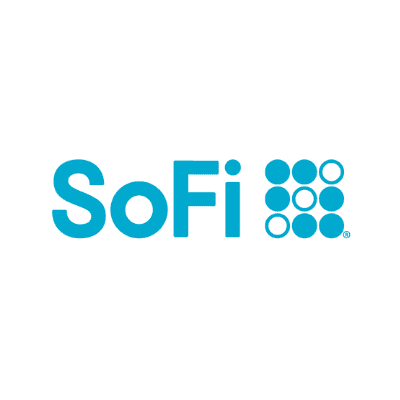If you’re new to investing or don’t want an active role in investing, you may consider a robo-advisor. A robo-advisor automatically invests your funds as determined by your risk tolerance, goals, and goals timeline.
You have many options when choosing a robo-advisor, but two of the most popular are SoFi vs. Acorns.
SoFi vs Acorns: Quick Guide
So what’s the difference between SoFi and Acorns? Check it out here.
SoFi: Key Features
SoFi is a popular platform for beginning investors who want an active role in investing, but they also offer a robo-advisor option for those who want passive investments.
SoFi’s largest pull is the free access they provide to financial planners. Most platforms charge a high fee per session for such access.
SoFi also doesn’t charge commissions on trades, has a user-friendly platform, and offers access to fractional shares.
Acorns: Key Features
Acorns is a popular option for investors who want to be completely hands-off or don’t have much money to invest. The platform invests your spare change by rounding up your purchases, and they offer cashback opportunities with their debit card to increase your portfolio further.
It also offers an optional (and free) checking account, allowing investors to invest completely hands-off.
SoFi vs Acorns: Account Types
Understanding the different account types is important, as each broker has different options. When choosing a broker, decide what you’re investing for and how soon you’ll need the funds to make the right choice.
SoFi
SoFi offers taxable and tax-advantaged accounts to help you reach your financial goals. Here’s what you can expect.
- SoFi Traditional IRA: A traditional IRA is an account you contribute to pre-tax. You get the tax deduction in the year you contribute, and in 2023, you can contribute up to $6,500, and those ages 50 and older can contribute an additional $1,000 as a catch-up contribution.
- SoFi Roth IRA: A Roth IRA is an account you contribute to after-tax. You don’t get a tax deduction the year you contribute, but your earnings and contributions grow tax-free. If you wait until age 59 ½ or older, you can withdraw the funds in retirement tax-free.
- SoFi Rollover IRA: A rollover IRA is a retirement account set up to roll over funds from an existing retirement account. This is a common occurrence for people who leave their job. Instead of leaving the funds in your employer’s 401K, you can roll them into your SoFi Rollover IRA. You have 60 days from receiving the funds from your existing retirement account to deposit them in a rollover IRA to avoid taxation and penalties.
- SoFi SEP IRA: A SEP IRA is for self-employed business owners. If you have employees, only you can contribute to their accounts, and your contributions must be uniform for all employees, but they don’t have to be made in consecutive years. SEP IRAs are also good for business owners without employees because the contribution limits of $66,000 or 25% of your annual income, whichever is less.
Acorns
Acorns doesn’t have as many account options, but they, too, offer taxable and retirement accounts.
- Individual Investment Accounts: Acorns offers only individual investment accounts. You cannot open a brokerage account with your spouse. These accounts are taxable, so you pay taxes on all capital gains; however, you can use tax-loss harvesting techniques to offset your liabilities.
- UGMA/UTMA Custodial Accounts: Acorns has the option to open custodial accounts for minors, getting kids on the right track financially early in life. The custodian manages the account for the child until they reach maturity, which is 18 in most states. At that point, the account gets turned over to the child to manage and use how they see fit.
- Banking Account With Debit Card: Acorns offers a free banking account with any Acorns account. In addition, the banking account comes with a debit card that offers benefits, such as round-ups and cashback to your investment portfolio.
- Acorns Traditional IRA: Acorns offers a variety of IRA options to help investors save for the future. Their traditional IRA offers pre-tax benefits, lowering your tax liability the year you contribute. However, all withdrawals are subject to your current tax bracket, which decreases your retirement money.
- Acorns Roth IRA: An Acorns Roth IRA offers tax benefits during retirement. You contribute money after you’ve paid tax on your income, but you don’t pay taxes on any contributions or earnings when you withdraw the funds during retirement (after age 59 ½).
- Acorns Rollover IRA: An Acorns rollover IRA allows investors to manage their retirement account themselves after they leave an employer. You have 60 days from the date you withdraw funds from an existing retirement account to open a rollover IRA and deposit the funds.
SoFi vs Acorns: Fees and Minimums
Before opening an account with SoFi or Acorns, it’s important to understand the minimum investments required and the fees charged.
SoFi
SoFi charges only a few fees, making it an attractive option for cost-conscientious investors.
Fees
As I discussed earlier, SoFi doesn’t charge commissions on most trades or have a monthly account fee. They do, however, charge certain miscellaneous fees, including the following:
- Outgoing wires: $15
- Returned payment: $15
- External transfers: $75
- Paper statements: $5
Minimums
SoFi doesn’t have account minimums. This means you can open an account with as little money as you want and don’t have to worry about carrying a specific balance after opening an account.
Acorns
Acorns also only charge a few fees, but there is one fee that gives SoFi a leg up on the competition.
Fees
Unlike SoFi, Acorns charges a monthly fee of $3 to $12 per month, depending on the account type chosen.
- Bronze is $3/month and includes a taxable and retirement account, plus a free banking account.
- Silver is $6/month and includes everything above plus IRA match and premium education.
- Gold is $12/month and includes everything above plus custodial banking accounts and premium benefits.
Minimums
Acorns, like SoFi, doesn’t have any account minimums. So you can invest as little or as much as you want and keep your Acorns account.
SoFi vs Acorns: Features
Comparing the features of SoFi vs. Acorns will give you a good idea of which account is right for you.
Likewise, comparing the features with the costs will help you understand which account will help you reach your financial goals.
SoFi
SoFi has many great features to consider, including the following.
- Commission-Free Trades: SoFi is a commission-free platform. This is great news for active investors as you’ll keep more of your profits when you don’t have to pay commissions. SoFi doesn’t charge commissions on ETFs, stocks, and cryptocurrency. However, you’ll pay a 1.25% upcharge when you trade cryptocurrency.
- Option to Buy Fractional Shares: If you don’t have enough funds to buy a share of stock, you can buy a fractional share with SoFi. Not all trading platforms offer this, so it’s a great feature. For example, if you want a share of Amazon but don’t have enough to buy a full share, you can purchase a fraction of a share and call yourself a shareholder.
- Option for Passive or Active Investing: SoFi has investing options for any type of investor. You can actively invest and manage your portfolio or passively invest and let SoFi do the legwork for you. SoFi offers a goals-based investment program, so your portfolio helps you reach your financial goals. SoFi has ten pre-built portfolios they use, each with competitive expense ratios.
- Access to Financial Planners: All SoFi investors get access to financial planners over the phone. The planners don’t work on commission, so you don’t have to worry about being pushed into something you don’t want. Most other advisors charge a fee for access to financial planners, so this is a large perk.
- High-Yield Savings Account: If you commit to monthly recurring deposits of $500 to your cash account, SoFi pays 0.25% APY. But if you commit less or don’t regularly contribute, the account earns 0.01% APY.
Acorns
Acorns has many features to consider, including the following.
- Round-ups: Acorn is best known for its round-up feature. This allows you to round up purchases made with your debit card to the nearest dollar or another threshold you set. The difference is set aside in a cash account and invested when you reach $5.
- Automatic Investing: Acorns handles your portfolio for you. After answering basic questions about your goals, timeline, and risk tolerance, they invest your funds in the best portfolio. Acorns has five portfolios to choose from, and they’ll automatically rebalance your account if it gets off balance.
- Earn: Acorns partners with thousands of retailers that will pay you cash for your purchase, but the money goes straight to your portfolio instead of receiving cash in your checking account. This increases your investment balance.
- Optional Banking Account: Acorns offers all its clients a free banking account. There aren’t monthly maintenance fees or minimum balance requirements. In addition, you have access to 55,000+ fee-free ATMs, early access to your direct deposit funds, free mobile check deposit, and digital checks.
SoFi vs Acorns: Safety
Safety should be your number one concern when dealing with any brokerage. Look for a firm that protects your privacy and is FDIC insured to keep your cash safe.
SoFi
SoFi offers many safety precautions, including two-factor authentication, SSL encryption, FDIC insurance, SIPC insurance, and fraud protection.
Acorns
Acorns also take security seriously. They are SIPC insured, FDIC insured and uses SSL encryption and multi-factor authentication.
SoFi vs Acorns: User Experience
When handling your investments, you want a brokerage that offers a user-friendly experience so you aren’t overwhelmed and can make quick choices. Here’s how SoFi vs Acorns adds up.
SoFi
SoFi offers a user-friendly platform for active investors without overwhelming them.
- Ease of Use: Because SoFi is hands-on, its user experience is a little more complex than Acorns, but still easy enough to learn fast, allowing investors to manage their portfolios easily.
- Online and Mobile Experience: SoFi has an online and mobile app experience that seamlessly integrates. You can access your account on your computer or phone and make investment decisions quickly.
Acorns
You can run Acorns on your computer or mobile app and get the same user-friendly features.
- Ease of Use: Acorns is meant to be an afterthought, giving investors a hands-off way to invest. Because of this, its interface is very easy to navigate because it doesn’t require a lot of input from investors after setting up their accounts.
- Online and Mobile Experience: You can access Acorns on your computer or mobile phone, giving you access wherever you are to check your balances, make changes, or contribute more to your account.
SoFi vs Acorns: Customer Service
Customer service is a key component of any investment firm you choose. Being able to have answers to your questions fast is important. Here’s how SoFi vs. Acorns compare.
SoFi
SoFi offers the opportunity for phone and chat support options. For phone support, call 1-855-456-7634.
Acorns
Acorns offers customer service via chat 24/7 through your app or the Acorns Help Center online, email, and by phone for emergency requests by calling 1-855-739-2859.
SoFi vs Acorns: Pros and Cons
It’s always important to weigh the pros and cons of a brokerage firm you’re considering. Here are the pros and cons of SoFi vs. Acorns.
SoFi
SoFi is great for active investors or anyone who wants to trade with low fees and have some flexibility with investment options.
Pros
- Available internationally, including the US, Hong Kong, China, Singapore, Japan, and Australia
- Offers both automated and self-directed options
- Has both taxable and retirement accounts
- Offers free financial advice
Cons
- Has limited investment options for active investors
- Its user interface is a little behind today’s technology
Acorns
Acorns is great for the hands-off investor who wants to focus on round-ups and not worry about their portfolio too much.
Pros
- Round-ups make it easy to invest with spare change
- Offers a passive investment option
- The user interface is very user-friendly
- No account minimums
Cons
- Only available to US citizens
- High monthly fees compared to account balances
Frequently Asked Questions
Choosing the right robo-advisor is a big decision. Here are some questions people ask regarding SoFi vs. Acorns.
What is an accredited investor?
An accredited investor has a gross income of at least $200,000 in the last two years or a net worth of $1 million or higher.
Are robo-advisors accredited?
Robo-advisors must follow the same safety precautions full-service brokers must follow. But like any investment opportunity, always do your research and be cautious before investing.
What are alternative investments?
Alternative investments are those in assets other than stocks or bonds. Common examples include art, hedge funds, and commodities.
What should I invest in first?
As a new investor, consider ETFs. They are diversified and have low expense ratios to help you get your feet wet when investing.
How do I build a diverse portfolio?
A diverse portfolio includes many types of assets, including stocks, bonds, crypto, real estate investments, and alternative investments. The key is to diversify as much as possible, or you can invest in already diversified ETFs.
How much money should I have in investments by 30?
By age 30, you should have a full year’s salary saved/invested for retirement. If you haven’t reached that, try increasing your contributions to reach your financial goals.
SoFi vs Acorns: Which Is Best For You?
Choosing SoFi vs. Acorns is a big decision. Acorns charges a monthly fee, and SoFi doesn’t. But Acorns offers features SoFi doesn’t, such as round-ups and cashback for your portfolio.
Decide if you want an active or passive investment platform and what you want to pay for your plan, as Acorns charges a monthly fee and SoFi doesn’t.






No comments yet. Add your own